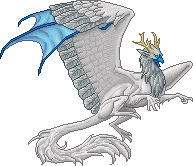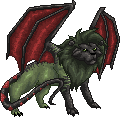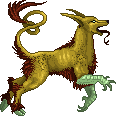Rosehill wrote:
The reason why the dominance and alpha talk is so prevailing is that it seems to work. But in most cases if the dog is manhandled, rolled over, growled at etc. when he misbehaves he just becomes too scared to do the misbehaving again, he's being supressed and, not really taught anything else than to be wary of his owners. If all you want is the misbehaving to stop, then of course the dominance based methods have done their job. The dog's inner state hasn't changed for the better however. If the dog is intimidated into supressing the "bad" behaviour he's still scared and worried inside. He hasn't learned what he should do, only what he should not do. (For exaple if you were learning to dance and the instructor kept poking you on the side with a stick every time you did something "wrong", do you think you'd learn fast with that what you should do? How about if the instructor instead praised you for when you did the correct thing? You'd know immediately what it was that was wanted from you.) The training methods that are based on more recent studies use positive reinforcement, i.e. rewarding the dog for doing the right thing. This method tells the dog exactly what is the behaviour he should be doing. As dogs learn in two ways: to do thing that are beneficial to them and to avoid things that are not beneficial or are harmful to them. If a dog learns that he gets a treat every time he lays down, he's bound to start laying down more often. After all that's the behaviour that's made good things happen before. If the dog is pushed to the down position or pulled from the leash and yelled at or leash popped when he rises the thing he learns is that rising makes things uncomfortable so better lay down. When laying down bad things weren't happening so I'll do that instead. He's choosing the lesser evil.
With regards to training, I will repeat that she was fully trained with normal procedures, the majority of which were positive reinforcement. She got treats for being good, and got extra perks, and at least while she was young we always avoided yelling or using the crate as punishment. But once she understood the boundaries and knew what she needed to do--and she did understand, because she could be perfectly behaved when she wanted to be--she didn't care anymore. She knew that being good would get her a treat or attention--but she knew whether we had food or not, and our attention did not always interest her. This in particular is not meant to be a statement about attempted dominance--this is just an attempt to describe her personality. I know that there are plenty of theories on this, and I'm sure that it can be explained, but it was my personal sense that it would not have mattered how we trained her. In order to keep her from trying to take control from us, we would have had to break her.
But back to dominance: I know that those methods are cast out because of the dog's mental state, but I honestly do not believe that they had any negative impact on this one. I would never try it with a dog who responded with fear, though I know the argument will be that I could not tell. I can only say that I never noticed any difference in behavior other than a long-suffering type of indulgence for a limited period of time. But, as mentioned, I cannot think of any reason why she would have thought she could get away with bullying me any more than anyone else. Nothing about it was particularly forceful--when I say that we 'made' her do something, I do not necessarily mean that we used physical force. The attitude is what was more forceful.
*Edited to clarify, since my last post did mention rolling her over: I suppose if she refused we were supposed to get her down by physical force, it just never came to that that I can remember. The changed attitude and refusal to back down got her to lay down when told, and the stare lasted until she turned away and relaxed her position. Seems like a bit of mixed signals, but that's what we were taught* Normally, we would expect a trained dog to obey when we state a command that they know. She didn't. A nice approach, perhaps with promise of something good, might work sometimes, but more often she dug her heels in. Therein lies the problem. I don't know that I am doing justice to my perceptions, but I do not think the same type of issue would arise with most dogs. I don't know that I've ever met another dog with the same type of spirit before. I admit that we treat our dogs more like children than pets the majority of the time, just with more rules and more strictly enforced, and thus are rather biased. But this particular dog always acted more like a young child than any other dog we had experience with. And the purpose of these statements is to further enforce that I
personally believe the attitudes and belying state of mind vary uniquely for each dog, and that some very well might act out dominance, if in a way more similar to an older sibling than a stereotypical pack animal.
On an unrelated note, I find the dance teacher reference amusing, because that is exactly how several of my dance teachers taught. If you aren't balanced, they try to knock you over. If your leg needs straightening, they knock it with a stick to see if it buckles.

Rosehill wrote:
She probably noticed you were easy to get to do things your way. Take for excample begging from a table. If person A never gives anything from his plate to the dog but person B on occasion does the dog is more prone to beg from person B, because he has been rewarded, reinforced, for that behaviour. He has never been reinforced for the behaviour by person A so he'll not try, because it hasn't been beneficial for him in the past. Dogs take several things as reinforcements, my own shepherd gets reinforced by me just glancing at him as he's a little velcro dog that lives for attention. If he can't get my attentnion by pawing my leg he'll try something else. I can then decide which is the behaviour I want to reinforce and can glance at him, praise him, pet him or treat him e.g. when he sits. As time goes by and more repetitions of the same pattern go by he'll be sitting earlier on the process and eventually catches on that sitting is the way to go to get what he wants. The process can be sped up with a clicker or some other marker to mark the excact correct behaviour so the dog will know which was the thing that got him the reward this time. The terrier got reinforced for "stealing" the kleenex. If you'd ignored it from the start she'd probably pretty quickly stopped and come up with something else that might've gotten your attention.

The growling after stealing something of value is a typical resource guarding behaviour, not dominance. Growling and lunging are the dog's way to say "this is mine, stay away, I'm afraid you'll take away my precius thing". If the thing is then taken away, the dog starts to anticipate that her precious thing will be taken away and tries to hide or defend her loot even more fiercely. Training the dog a solid "drop it" by exchanging her things for even better things, rewarding her when she let's go of something and never making a big fuss about the exchange teaches her that it's natural to let go of things and when she gives up something she'll get something even more awesome instead, so it's beneficial to let go of the thing she's got.
While I fully understand what you are saying, it does not fit with any experiences I had with this dog; hence my statement that I do personally believe dominance is a factor for some. With regards to the first point: All members of the family were on the same page with what was and was not allowed, and we all followed the same behavior. I never gave in to anything that someone else in the family wouldn't, so to me there is no reason included here that she would try intimidation and force with me and not the other members of my family. We got her as a puppy straight from a good, reputable breeder, so as far as I know there was no experience before us that would encourage that distinction. But once she was grown, I was not bigger than her, and by family interactions she witnessed I would understand if she saw me as more on her level for no better reason than that I was the bottom of the food chain.
And yeah, we had a clicker--it had absolutely no effect past the first week or so. The trainer was really set on that, so we kept on trying it, but nothing. And like I said, once she got past the training stage rewards didn't help. We couldn't keep giving her a treat for everything she did right for the nine years we had with her, and she didn't care too much if we praised her when it meant she hadn't gotten something she wanted. She knew all the commands and what was expected of her; she just never seemed like the type of dog who works to please its masters.
With my previous example of stealing: I recognize that in the lesser case it was a reinforced behavior. That was actually what I was trying to get at--the difference between what was established as OK, whether purposefully or not, and the things that were never okay recognized as such. Stealing the kleenex was playful. Stealing food was willful. In the first case, everything was dandy. In the second case, she knew it was wrong, knew what the potential rewards or consequences were, and did not care because she would rather make her own definition of what she could do.
As far as the issue with possessiveness: I agree with the idea that dogs don't like it when you take things away (yes, this is an uber simplified dumbed down version). We did our best to make it clear that we would not take what was hers. What we were taught to do when she showed that hint of aggression was to take what she had slowly, hold it in plain sight until she stopped, and then hand it back to her and let her take it from our hand.
Perhaps this was not the best example of what I was trying to say, but I'll try (and perhaps fail, since I myself am not entirely sure of what I was trying to say) to clarify: It was OK for her to take her own toys. In this case we tried to encourage her to trust us so that she would not act aggressively if people came near her--we knew she would not bite, but strangers did not. We could also tell the difference between her play growl and her serious growl--strangers could not. It was not OK to take what was not hers. In this case her possessiveness was not tolerated, because the thing she tried to keep from us did not belong to her. She took from us, and where we gave back her things, she was not giving back ours.
Rosehill wrote:
I'd be more inclined to say that instead of being dominant some dogs are more pushy, demanding, rude and confident. They don't aim to be the ruler of the pack or the king of the household. They push the limits and try to see what they can get away with. It's not dominance, it's just selfish behaviour.

If I could get away with just surfing the net all day instead of doing my job at work I would. Dogs are somewhat the same, why do anything extra if you don't have to. And if some behaviour (e.g. jumping up on people, peeing on the floor, rushing through the door etc.) gets them what they want, theyäll keep doing it. The dogs are hedonistic beings living in the moment and they will act based on what's most beneficial or least harmful for them on any given moment.
And in this case, I think we are defining dominance in a different way. By saying that she was trying to assert dominance, I mean precisely that she was pushing boundaries to see how she could get her way. But somewhere in there, she seems to have realized that she doesn't have to just push the boundaries, she can break them. If she wants to do something, she can do it, and all we can do is get upset. If she was in a mood to please us, she had no trouble controlling herself. Yes, misbehaving got her what she wanted--because the gratification was a greater reward than we could give her for not doing it. There needed to be some level of enforcement beyond reward and punishment, or there would no longer be any reason to behave. Our new terrier occasionally has short-lived bursts of this, but it doesn't have the same feel. Where our Airedale made it obvious that she could make the connections between behavior and reward/punishment, he doesn't seem to recognize it at all. He gets too caught up in whatever he's doing to even realize that we're there with him. I would not try to use dominance tactics on him, because I feel that it would scare him, and that he would not make the immediate connection between our sudden change in attitude and his behavior. He also has not been trained yet beyond simple commands and what he picks up from our normal responses (we tried to get him into a class but he was having trouble fighting off worms at the time, and since I am not at home for the majority of the time I have no control over when it gets picked up again). Since a rewards system has not been a tried and failed process with him, I see no reason to try anything different.
Rosehill wrote:
To me that behaviour sounds like a normal puppy appeasement behaviour, not a dominance/alpha thing. Men tend to be larger and have lower voices than females so depending on the dog he can take a better liking of the man because the man seems to be confident (i.e. know what he's doing, a person worth to be around, the dad figure, not a dominant leader) or the flip side is that some dogs are intimidated by the males and roll over, sometimes pee and show other signs of appeasement because they are unsure if the person is dangerous and they are offering peace signals to keep the situation mellow. If your dog is also trying to lick your father's face, wiggles his whole little body and sort of "growels" for him, those are some other good signs that he's going something along the lines of "oh, but I'm a little puppy and I'm a little worried about the situation but see as I'm just a puppy there's no need to do anything bad to me and I like you so much but I can't quite control myself".

Again, I think that I just use dominance to mean something different than you do, most likely because I do not make a habit of reading up on these things and using correct terminology. I have no recent background with this type of study and prefer explain things in the way that make sense to me. When I say that our new puppy is treating the head of the house as an alpha, I mean that he makes more of an attempt to please with him than with the rest of us. Just like there is no reason I can think of for our Airedale to treat me differently at first, there is no reason I can think of that the new dog would treat my father differently. The idea that he sees him as in some way above the rest of us, as a 'dad figure' is synonymous to me with seeing him as an alpha. That the puppy might be a "little worried about the situation" implies to me that there is something about the strong male figure that makes him worried, and I would define this in my own way of thinking as an alpha factor.
I think the main difference we have here in opinion comes from that definition of dominance/alpha (though I don't mean to put words in your mouth, so please correct me if I am wrong). I don't mean to compare dog-human interactions to dog-dog interactions, which I have little chance to observe or learn about. Instead I tend to describe things in terms of adult-child human interactions, where dominance becomes a desire to arrange things in your way and a stubbornness against compromise, while alpha becomes a term for the parent, who makes and enforces the rules whether you recognize them as above you or not.
-----------------------------
Sorry for the lengthiness of this post and any repetition--I lost track of where I was at several points. Hopefully it's somewhat understandable, but I have my doubts considering the general mushiness of my brain right now.























